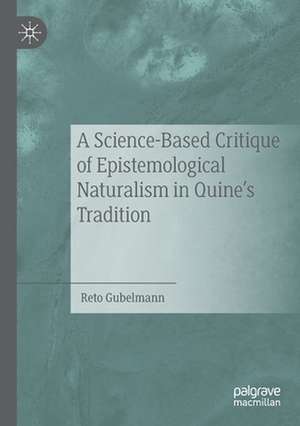A Science-Based Critique of Epistemological Naturalism in Quine’s Tradition
Autor Reto Gubelmannen Limba Engleză Paperback – 14 aug 2020
At the intersection of epistemology, metaphilosophy, and philosophy of science, this exciting new book examines the epistemic limits of empirical science. It makes a unique contribution to research on epistemological naturalism in Quine’s tradition by criticizing the position based on first-order data from empirical psychology and the history of natural science. This way, it meets the naturalist on their own ground not only regarding subject matter, but also regarding their epistemic methods. The book explores the works of a variety of philosophers in the field, including W. V. Quine, Penelope Maddy, Tyler Burge, Stathis Psillos and Howard Sankey.
By carefully considering experimental results from behaviourism as well as developmental and perceptual psychology, Gubelmann finds that none of these disciplines can furnish the epistemic means to successfully naturalize the central cognitive preconditions of scientific theorizing. Furthermore, Gubelmann presentsnovel arguments for the claims that epistemological naturalists are committed to scientific realism, and that they are unable to defend this position. Based on these results, Gubelmann concludes that epistemology is not part of empirical science, which directly contradicts epistemological naturalism.
By carefully considering experimental results from behaviourism as well as developmental and perceptual psychology, Gubelmann finds that none of these disciplines can furnish the epistemic means to successfully naturalize the central cognitive preconditions of scientific theorizing. Furthermore, Gubelmann presentsnovel arguments for the claims that epistemological naturalists are committed to scientific realism, and that they are unable to defend this position. Based on these results, Gubelmann concludes that epistemology is not part of empirical science, which directly contradicts epistemological naturalism.
| Toate formatele și edițiile | Preț | Express |
|---|---|---|
| Paperback (1) | 386.00 lei 6-8 săpt. | |
| Springer International Publishing – 14 aug 2020 | 386.00 lei 6-8 săpt. | |
| Hardback (1) | 507.62 lei 6-8 săpt. | |
| Springer International Publishing – 8 aug 2019 | 507.62 lei 6-8 săpt. |
Preț: 386.00 lei
Nou
Puncte Express: 579
Preț estimativ în valută:
73.87€ • 76.84$ • 60.98£
73.87€ • 76.84$ • 60.98£
Carte tipărită la comandă
Livrare economică 14-28 aprilie
Preluare comenzi: 021 569.72.76
Specificații
ISBN-13: 9783030245269
ISBN-10: 3030245268
Pagini: 286
Ilustrații: XIX, 286 p. 5 illus., 3 illus. in color.
Dimensiuni: 148 x 210 mm
Greutate: 0.37 kg
Ediția:1st ed. 2019
Editura: Springer International Publishing
Colecția Palgrave Macmillan
Locul publicării:Cham, Switzerland
ISBN-10: 3030245268
Pagini: 286
Ilustrații: XIX, 286 p. 5 illus., 3 illus. in color.
Dimensiuni: 148 x 210 mm
Greutate: 0.37 kg
Ediția:1st ed. 2019
Editura: Springer International Publishing
Colecția Palgrave Macmillan
Locul publicării:Cham, Switzerland
Cuprins
1. Introduction.- 2. Quine I: The Bold Physicalism of Word and Object.- 3. Quine II: The Evolutionary-Perceptional Account.- 4. Burge: Proto-Predicates in Perceptual Representations.- 5. Maddy: Conceiving Logic as an Innate Cognitive Mechanism.- 6.Quine's Empiricist Justificatory Monism.- 7. Why Justificatory Monism Needs Scientific Realism.- 8. Scientifically Defending Realism I: Psillos' Holistic Approach.- 9. Scientifically Defending Realism II: Maddy's Piecemeal Realism.- 10. Conclusion.
Notă biografică
Reto Gubelmann is a part-time lecturer in Philosophy at the Universities of Zurich, Switzerland, and St.Gallen, Switzerland, and head of program development at the University of St.Gallen. He specializes in epistemology, metaphilosophy, philosophy of science, and Quine.
Textul de pe ultima copertă
At the intersection of epistemology, metaphilosophy, and philosophy of science, this exciting new book examines the epistemic limits of empirical science. It makes a unique contribution to research on epistemological naturalism in Quine’s tradition by criticizing the position based on first-order data from empirical psychology and the history of natural science. This way, it meets the naturalist on their own ground not only regarding subject matter, but also regarding their epistemic methods. The book explores the works of a variety of philosophers in the field, including W. V. Quine, Penelope Maddy, Tyler Burge, Stathis Psillos and Howard Sankey.
By carefully considering experimental results from behaviourism as well as developmental and perceptual psychology, Gubelmann finds that none of these disciplines can furnish the epistemic means to successfully naturalize the central cognitive preconditions of scientific theorizing. Furthermore, Gubelmann presents novel arguments for the claims that epistemological naturalists are committed to scientific realism, and that they are unable to defend this position. Based on these results, Gubelmann concludes that epistemology is not part of empirical science, which directly contradicts epistemological naturalism.
By carefully considering experimental results from behaviourism as well as developmental and perceptual psychology, Gubelmann finds that none of these disciplines can furnish the epistemic means to successfully naturalize the central cognitive preconditions of scientific theorizing. Furthermore, Gubelmann presents novel arguments for the claims that epistemological naturalists are committed to scientific realism, and that they are unable to defend this position. Based on these results, Gubelmann concludes that epistemology is not part of empirical science, which directly contradicts epistemological naturalism.
Caracteristici
Offers a unique contribution to the literature on epistemological naturalism in Quine's tradition Located at the intersection of epistemology, metaphilosophy, and philosophy of science Provides a novel argument for the claim that epistemological naturalists are committed to scientific realism
